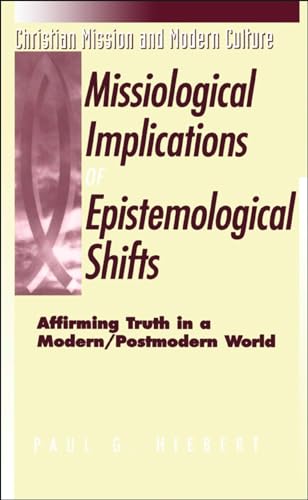Missiological Implications of Epistemological Shifts
Affirming Truth in a Modern/Postmodern World (Christian Mission & Modern Culture)
Paul G. Hiebert
BOOK REVIEW

The landscape of belief and understanding is undergoing a seismic shift-one that is both exhilarating and terrifying. In Missiological Implications of Epistemological Shifts: Affirming Truth in a Modern/Postmodern World, Paul G. Hiebert takes us on a journey through the convoluted corridors of contemporary thought, dissecting how our epistemological frameworks influence how we engage with faith and mission work in an ever-changing world. This isn't merely an academic exercise; it's a clarion call to reflect on the very foundations of our beliefs in a society saturated with conflicting ideologies.
Hiebert challenges you to reconsider what you think you know. This book is not a passive read; it compels you to confront your assumptions about truth, knowledge, and the way these intersect with Christian missions. When Hiebert writes about the epistemological shifts between modern and postmodern thinking, he doesn't just present theories; he ignites a conversation about what it means to affirm truth in a world where relativism runs rampant. As you delve into his insights, expect to be confronted with questions that reverberate in your mind long after you've turned the last page. Are we on a quest for genuine truth, or are we merely constructing comforting narratives that fit our ideologies? 🤔
Throughout the book, Hiebert draws upon a rich tapestry of cultural, philosophical, and theological threads, entwining them in ways that reveal the implications these shifts have for Christian missionaries. He isn't afraid to tackle the elephant in the room-the troubling tension between evangelism and cultural sensitivity. As you ponder his analysis, you might feel a pang of discomfort, recognizing the challenge of articulating your faith credibly in a pluralistic society. Hiebert's discussion is not just theoretical; it's intensely practical. He lays out strategies and recommendations that empower individuals and churches to navigate these treacherous waters without sacrificing integrity or relevance.
Although published in 1998, Hiebert's work has only grown more prescient as society grapples with complex issues like identity, inclusivity, and the nature of truth. Readers from varying backgrounds have responded passionately-some lauding Hiebert's bravery in tackling these important yet controversial topics, while others express skepticism about his insistence on an absolute truth. This dichotomy highlights the urgency of Hiebert's mission: to awaken the church to its role in a postmodern context where the questions of faith can often feel overshadowed by the cacophony of cultural critique.
Perhaps the most riveting aspect of Hiebert's writing is his ability to stir the pot, igniting rich discussion that resonates in theological seminaries and local churches alike. Critics argue that he simplifies complex ideas, while supporters champion his straightforward approach, which demystifies daunting philosophical concepts. The tension between these voices reflects the core of what Hiebert strives to unravel-an invitation to deliberate, to debate, and ultimately, to arrive at a deeper understanding of one's faith.
By the end of this book, you might find yourself transformed, peering through a new lens that challenges the status quo. You will not only have engaged with ideas but also experienced a profound shift in perspective, one that invites you to act-to rethink your approach to belief in a world that often feels hostile to dogma. As readers grapple with Hiebert's challenging propositions, the questions he raises can set a new course for how faith and mission intertwine in a 21st-century context.
In a time when clarity is desperately sought, yet rarely found, Missiological Implications of Epistemological Shifts stands as a beacon-a text that dares to affirm the possibility of truth amidst chaos. Embrace this work, and allow Hiebert to guide you through the labyrinth of modernity into a more profound understanding of who you are and what you believe. 🌍💫
📖 Missiological Implications of Epistemological Shifts: Affirming Truth in a Modern/Postmodern World (Christian Mission & Modern Culture)
✍ by Paul G. Hiebert
🧾 152 pages
1998
#missiological #implications #epistemological #shifts #affirming #truth #modernpostmodern #world #christian #mission #modern #culture #paul #hiebert #PaulGHiebert